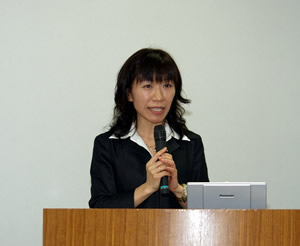
|
|
Ms. Yuki Shuto
|
After the address, the Manager of the NS Net Division introduced the activity policy of the Japan Nuclear Technology Institute (JANTI) and the current activity status of the NS Net Division itself. This was followed by a presentation by Yuki Shuto, the director/deputy general manager of the Research Institute for Social Safety and the manager of the Institute's Human Factor Research Department, with the title "What is Safety Culture? --- Strategy for ensuring the solid implementation of adopted protocols ---"
Lecture highlights
The "Safety First" approach often perceives "economy, productivity, efficiency" and "safety" as mutually conflicting values, and stresses the importance of preventing "amoral calculation" that ignores safety. Many on-site workers believe that they always put "safety first" and that on-site personnel would never place efficiency before safety. While being fully aware of the importance of "safety culture", they often feel at a loss as to what specific steps they can take to ensure it. Analysis of past cases in which "organizational safety culture" was an issue, indicates that economy was not necessarily prioritized over safety. It was when people gradually stopped abiding by an adopted protocol (normalization of deviation) that an accident was triggered.
The human behavior of "not abiding by an adopted protocol" is classified as a human error category of "violation", which is a relatively new concept. The importance of countering it has become widely recognized in recent years. However, there are no easy countermeasures or systematic methodologies despite the fact that initiatives to address the issue are conducted in various fields.
Based on a unique initiative actually implemented in the aviation/chemical industries, the approach to control this type of human error has been summarized into four steps, i.e. (1) establishing "good rules", (2) circulating them and ensuring their implementation, (3) constantly checking the compliance status and (4) assessing the compliance status and penalizing violations as required.
Comments from the survey conducted after the presentation:
○This presentation was very informative as it dealt with issues that on-site personnel face every day. In regard to the normalization of deviation, the approach to administrating rules was particularly useful. I will utilize the information in our current efforts to streamline rules.
○The presentation explained how we should examine rules from the perspective of whether they can be actually observed, thereby reinforcing the importance of establishing good rules. It was a very useful presentation.
○The approach of reviewing rules is difficult yet effective. The ten principles of Dupont were interesting and convincing. |







